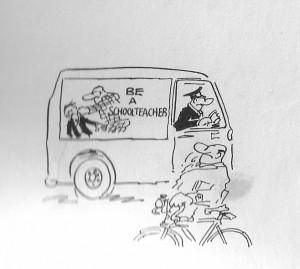“Why don’t other teachers talk to us the way you do?”
Doesn’t sound too bad does it? and I can think of more upsetting responses, for example the girl who burst into tears because she didn’t think she could do the work I’d set – that really didn’t make me feel great. I’m not sure what you’d have said to the tears. I said,
“This is only school; it’s not the most important thing in life and if you don’t understand the work it’s not your fault, it’s mine.”
Not much rigour there is there? what would that nice Mr Gove think or indeed his mannakin? I ask myself that a lot; it’s a kind of touchstone across education, training and adoption practice for me – I ask myself what he would think and think the opposite.
The context for the question “Why don’t other teachers talk to us the way you do?” was the end of a lesson with a really nice mixed ability group. We were sitting in a circle reading and discussing a text (in those days we used to read and discuss whole books); one of the higher attaining students mentioned the upcoming mock exams and the fact that he did not expect to do well and there was general agreement.
I was taken aback by the lack of confidence and expectation of failure – where had that come from?
So I said, “Don’t let anyone, ANYONE, tell you you’re not at least as bright, AT LEAST AS BRIGHT, as the people teaching you.”
It was an easy thing for me to say because I believed it. I went on to contrast what we expected of them with the kind of behaviour we displayed; they were expected to concentrate, pay attention and not complain while sitting through a constant diet of what was, on the whole, pretty boring stuff. If they complained they were punished. Most of us, on the other hand, seemed to think we knew everything and were always right – the last thing we could tolerate was dissent, a threat to our discipline. Colleagues seemed to think they were in a potential war zone and without repression we would all be lost.
I guess it’s different now – all that climate for learning stuff will be properly embedded; assessment will be formative and summative and fit for purpose; we’ll have a mix of teaching styles and strategies; dissent (AKA independent thinking) will be encouraged; teacher expectations will be high and learners will be confident and encouraged – in your dreams!

We now have a curriculum which is less relevant than ever, a manic preoccupation with testing rather than learning, the kind of rigour that brings rigor mortis, a dilution of teacher training and an approach to educational provision that prohibits local authority involvement in planning provision but allows anyone else (particularly if they are slightly mad or from the private sector) to have a go – a bit like the health service I suppose. What’s not to like?